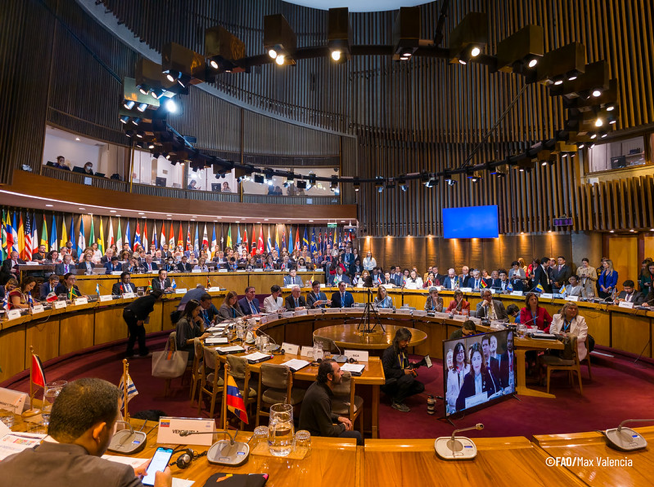SDG 6 meeting at the 6th Forum of the Countries of Latin America and the Caribbean on Sustainable Development 2023
Work area(s)
Topic(s)
On Thursday, April 27th, the first meeting of the 6th forum on SDG 6 - Clean water and sanitation, took place. This meeting served as a space for reflection and exchange of experiences on issues related to water resource management. A variety of actors, both from the public and private sectors, had space to share their thoughts. Countries also shared their vision on SDG 6 and what is being done to reach the 2030 goals. Important topics such as drought, floods, water financing, and governance were highlighted throughout the session.

SDG 6 was the first SDG session of the sixth forum, opening dialogues among diverse actors. The meeting began with an introduction of the present actors and the water situation in LAC by Carolina González, head of the Temporary Special Executive Unit "International Affairs and Federal Cooperation" of the Ministry of Social Development of Argentina.
This was followed by the presentation of the Minister of Economy, Planning and Development of the Dominican Republic, Pavel Isa Contreras, who presented the topic of Clean Water, Sanitation and Integrated Water Resource Management. He mentioned that irrigation consumes a significant portion of water resources and that only 18-25% is used efficiently. In addition, there are significant gaps in access to drinking water, as well as institutional problems. Reforms were proposed, such as the creation of a national water authority, a general water law, and water management policies in basins. The current situation of the country towards SDG 6 was also presented, highlighting the coordination between water providers and sanitation services.
The second intervention was given by Mario Lubetkin, the regional representative of the FAO for Latin America and the Caribbean, who presented the world's water situation and its link to food, highlighting that the region has important opportunities and that the FAO provides technical assistance to adopt climate-resilient agriculture. In addition, the increase of hunger in LAC, the lack of access to water and sanitation, and the commitments of the FAO to support water governance and improve information and data on the resource were mentioned. In conclusion, the importance of promoting the water-food-environment nexus was emphasized.
Daniel Tugues, Deputy General Manager of Aguas Andinas, spoke about the Chilean model of water management, which incorporates the private sector. He also presented current challenges related to extreme weather events and water scarcity, and how Aguas Andinas is investing in more resilient solutions. He concluded by emphasizing the importance of sharing experiences and solutions with other countries.
Ruth Spencer from the Yale International Alliance of Antigua and Barbuda highlighted that water is a basic right for all and that inclusive participation is necessary to achieve the SDG 6 goal. In the context of the Caribbean islands, the price of water has increased due to drought, noting that countries with water problems tend to accumulate debts to maintain access to water for the population. Ms. Spencer mentioned the importance of local community knowledge in situations of extreme drought and briefly mentioned that the private sector experience in Chile could be useful for the Caribbean island states.
Freddy Mamani, Vice Minister of Foreign Relations of the Plurinational State of Bolivia, highlighted the importance of public effectiveness, government collaboration, investment in sanitation, and innovation to be resilient in water matters. He emphasized that the number of people who experience water scarcity in urban areas is increasing, highlighting the importance of equitable access and reversing negative externalities. Bolivia's experiences and commitments were shared, and the importance of the results of the United Nations Water Conference being part of the agenda and working together in the face of the climate crisis was emphasized.
Regarding the interventions of countries and organizations, Brazil highlighted its progress in implementing SDG 6, with a focus on water resource management. Chile pointed out the need for transformative changes and integrating different efforts to address water issues. Guatemala emphasized the role of investments in achieving goals. Honduras highlighted water governance and efficient resource management at the local level. Peru emphasized the importance of data and financing to address water challenges. Barbados presented the situation of agricultural drought and highlighted the interconnectedness of water issues with other important topics, such as food security. Venezuela affirmed that water will not be privatized in the country and emphasized its commitment to guarantee access and sanitation for all. Costa Rica indicated that there are significant gaps in access to water in rural areas. Mexico spoke about the right to water and its national development plan aligned with the 2030 agenda. The United States expressed its commitment to water security with projects in Ecuador and Guatemala. Argentina mentioned the importance of financing for water management and the need for international cooperation. UN Women talked about the difficulties faced by indigenous communities and the importance of training. Paraguay highlighted the importance of the Plata basin and its treaty.